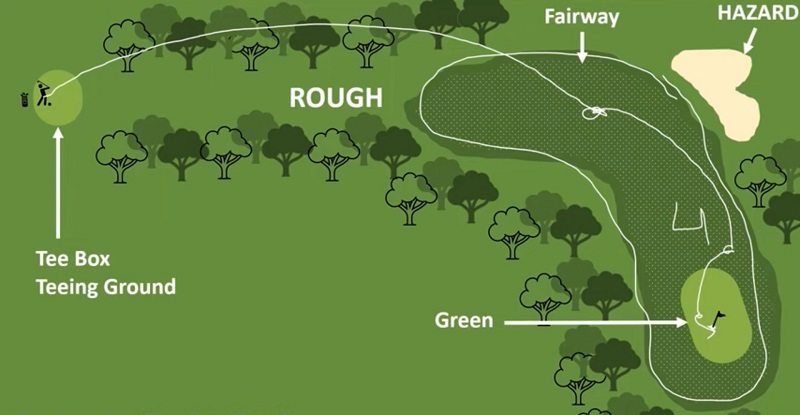Golf is a sport for all ages and skill levels, offering a lifetime of enjoyment. Whether trying something new or hoping to challenge yourself on the course, Golf provides an opportunity for personal growth and development that both beginners and experienced players can enjoy.
This guide will cover the fundamentals for those just getting started in the game – from proper swing technique and club selection to helpful tips on courses and etiquette. With this knowledge, you’ll be ready to hit the course confidently and begin your journey into one of the most rewarding sports!
Why Should You Play Golf?
Golf is a centuries-old sport that all skill levels and ages can enjoy. It’s a great way to exercise, socialize, and spend time outdoors without needing extensive gear or physical requirements. Golf can be played individually or in groups, making it an enjoyable activity for all ages and types of players.
The basics are easy to pick up for beginners looking to learn how to play Golf. The most important part of learning how to Golf is mastering proper swing technique and club selection, which can be easily learned at a local driving range or practice facility. Once the fundamentals are down, it’s time to start playing on the course.
Benefits Of Playing Golf – Exercise, Socializing With Friends & Family
Golf is a great way to exercise, socialize with friends and family, and improve your skills. Its relaxing nature makes it a great game for all skill levels and ages. Even if you’re just a beginner, you can still enjoy and benefit from the game in many ways.
For starters, Golf provides an excellent form of exercise. Walking the course and swinging your golf clubs can help improve your overall fitness level. The game also encourages proper posture, which can help you maintain healthy spine alignment. Additionally, playing Golf regularly has been linked to improved mental health, as it requires focus and concentration that can help reduce stress while boosting endorphins.
Golf is also a great way to socialize with friends and family. Playing Golf together can create an enjoyable atmosphere where you can catch up on life or escape the everyday hustle and bustle. You’ll always have something to talk about, whether discussing strategy or celebrating your success on the course.
Finally, Golf can help you improve your skills. As a beginner, it’s important to focus on the fundamentals – from proper swing technique and club selection to helpful tips on courses and etiquette. As you become more experienced with the game, you’ll find it increasingly rewarding as your skills develop.
Understanding The Basics Of Golf

Before we dive into the details, let’s cover the fundamentals of the game.
The Objective
In golf, the foremost objective is to traverse the course consisting of either 18 holes (or 9 holes) while completing each with the lowest number of strokes possible. The difficulty of each hole is indicated by a pre-determined “par” value, representing the optimal number of strokes required to sink the ball into the hole. Your score is calculated by comparing the number of strokes you take to the par value for each hole.
The Golf Course
Golf courses are a testament to the beauty of nature, combining challenging gameplay with visually stunning surroundings. A standard course offers 18 distinct holes, each with its own unique characteristics and difficulties, making each round truly one-of-a-kind. Golfers can expect to encounter par-3, par-4, and par-5 holes throughout their game, each requiring a different strategy and set of skills.
The courses themselves are often situated in idyllic, natural landscapes, complete with water hazards, sand bunkers, and carefully contoured greens. And while each course may present its own set of challenges, the golfing experience is always a rewarding one, both for beginners and seasoned veterans alike.
Golf Clubs
As a novice golfer, navigating the world of golf clubs can be overwhelming. With a range of options available, it’s essential to understand the primary categories of clubs and their specific functions on the course. Woods, irons, wedges, and putters all serve distinct purposes, from providing maximum distance with the driver to achieving precision with the putter. While investing in a full set of clubs is tempting, starting with a basic set can help you develop your skills and get a feel for which clubs suit your playing style. With a little bit of knowledge and practice, you’ll be on your way to mastering the game of golf.
Golf Balls
Golfers always look for that perfect ball to help them achieve their desired performance. Golf balls come in different materials and constructions, which considerably impact how they fly and roll on the course. For beginners, starting with cost-effective and durable golf balls is a smart move as you get used to the game and develop your skills. As your technique advances, you should consider more sophisticated options that suit your playing style and level. Always remember that the type of golf ball you choose can significantly affect your game, so it is essential to choose wisely.
Golf Etiquette
Golf is a sport steeped in tradition, and as such, it has its own set of unwritten rules and customs that players should adhere to. These guidelines foster a respectful and enjoyable atmosphere on the course. Some of the primary etiquette principles include:
- Respecting Fellow Players: Demonstrating respect for your fellow golfers is crucial in maintaining a pleasant playing environment. This includes remaining silent during their shots, refraining from unnecessary movements that may distract them, and waiting patiently for your turn.
- Maintaining the Course: Preserving the golf course’s condition is a shared responsibility among players. This involves repairing any divots and ball marks you create on the greens and fairways. Additionally, raking sand bunkers after use and properly disposing of any trash contributes to keeping the course in pristine condition for all to enjoy.
- Pace of Play: One of the essential elements of golf etiquette is adhering to a reasonable pace of play. This prevents delays for other groups on the course. To maintain the appropriate pace, be ready to play when it’s your turn, plan your shots ahead of time, and keep up with the group in front of you. If your group is consistently slower than others, allowing faster groups to play through is good practice.
- Safety First: Prioritizing safety on the course is essential. Always be aware of your surroundings and ensure no one is within range before taking a swing. If there’s a possibility your ball might hit or come close to another player or group, it’s customary to yell “fore” as a warning.
Essential Golf Techniques
To fully appreciate the game and enhance your skills, it’s vital to master some fundamental techniques:
The Grip
The grip is a critical element in achieving control and power in your swing. There are three popular grip styles: overlapping, interlocking, and baseball grips. Try each of these methods to determine the one that suits you best.
The Stance
Establishing a proper stance is crucial for a successful swing. Position your feet shoulder-width apart, with your knees slightly bent and your weight evenly distributed between both feet. Maintain a straight back and lean forward slightly from your hips. This posture will provide stability and balance throughout your swing.
The Swing
A golf swing comprises a few key phases: the backswing, the downswing, and the follow-through. Concentrate on preserving a smooth, fluid motion from start to finish, ensuring that you make solid contact with the ball. For beginners, it’s wise to initiate your practice with short, controlled swings before gradually progressing to full swing. This approach helps build confidence and lets you focus on honing your technique.
Putting
Putting is an essential aspect of golf that requires precision and a steady hand. Begin by establishing a comfortable grip on your putter, with your hands placed slightly lower than they would be for a full swing. When addressing the ball, bend your knees slightly and position your eyes directly over the ball. Focus on a smooth pendulum-like stroke, keeping your wrists firm and maintaining a consistent tempo.
By focusing on these fundamental techniques, you’ll develop a strong foundation for your golf game and set yourself up for success as you continue to learn and grow in the sport.
Golf Terminology
To truly embrace the world of golf, becoming acquainted with some frequently used terms is beneficial. Here are a few to familiarize yourself with:
- Birdie: A score that is one stroke under par for a specific hole
- Bogey: A score that is one stroke over par for a specific hole
- Fore: A warning shouted when a ball might be heading in the direction of another player or group
- Green: The smooth, grassy area around the hole where putting takes place
In addition, there are many terms you need to learn, such as Hole In One (Ace), Par, Strokes, Albatross, etc. Once you know the basics, it’s time to get out there and start playing!
Embarking on Your Golf Journey

Choosing Equipment
As a novice golfer, there’s no need to invest in costly, high-end equipment. Opt for reasonably priced, beginner-friendly sets that include the necessary components: a driver, a selection of irons, a wedge, and a putter. Additionally, you’ll require golf balls, tees, and a golf bag.
Locating a Suitable Golf Course
Select a local golf course that welcomes beginners and provides a relaxed atmosphere. It should offer a variety of tees to cater to different skill levels. Many golf courses also feature practice facilities like driving ranges and putting greens, which are ideal for refining your skills before venturing onto the course.
Enrolling in Lessons
Consider enrolling in lessons with a certified golf instructor to help develop proper techniques and steer clear of bad habits. Group lessons can be a cost-effective alternative and present an opportunity to connect with other beginners who share your enthusiasm for the sport. These lessons can also create a supportive environment where you can learn from each other’s experiences and progress together.
Improving Your Game
As you progress in your golf journey, keep these tips in mind to help you improve:
- Practice regularly, both on and off the course
- Focus on mastering the fundamentals before moving on to more advanced techniques
- Be patient and remember that improvement takes time and dedication
Joining a Golf Community
Golf is not just a sport, it’s a community. And what’s the point of playing if you can’t share the experience with others? Meeting fellow golfers is a surefire way to enhance your enjoyment of the game. Not only can you learn from your peers, but you’ll also have someone to celebrate your successes with and commiserate with over your struggles. So why not join a local golf club or participate in social leagues and tournaments? You’ll have the opportunity to meet like-minded players and form new friendships. Plus, who knows? You might even find a new golf partner or two.
Staying Motivated In Your Journey As A Golfer
To stay motivated in your journey, it’s important to set achievable goals. Start by setting small, attainable goals such as hitting the ball straight and consistently, staying within par on certain holes or improving your score over time. As you achieve these smaller goals, continue challenging yourself with bigger ones.
Working with a pro or taking lessons can help you stay motivated and on track while learning to play Golf.
Regular breaks are also important as it gives you time to practice your swing, review course etiquette and better understand the game. Additionally, getting involved in a local golf club or joining a golf league can be great ways to meet new people and stay connected to the game.
Tips For Beginner Golfers – Courses To Play On, Helpful Advice

Golf is a great sport for all skill levels and ages. Whether you’re just starting or looking to refine your skills, Golf can be a challenging and rewarding experience. From proper swing technique to club selection and course etiquette, there are many fundamentals that beginner golfers should understand before hitting the course. With the right knowledge, beginner golfers should be ready to enjoy their first round confidently.
One of beginner golfers’ first steps is finding a course that fits their skill level. Beginner courses are typically shorter and have wide fairways, allowing for more room for error. Many top-notch courses also offer introductory programs geared toward beginners. Look for courses with forgiving roughs, wide fairways, and fewer hazards. This will give the beginner golfer more time to concentrate on learning proper swing techniques without worrying about their score.
When playing Golf, beginners should focus on mastering the fundamentals. Start by getting comfortable with your grip, stance and posture before moving onto the swing. Each player’s swing is unique, but there are many basics that all beginner golfers should be familiar with. For example, players should learn how to properly position their body and arms during the backswing and follow-through and how to rotate their hips and weight for a smooth motion. Once the basics have been mastered, start working on more advanced techniques such as controlling your club face at impact, controlling ball flight and avoiding common mistakes such as topping the ball.
Finally, a big part of Golf is etiquette and sportsmanship. A few tips to get you started include: always practice courtesy on the course, respect the game and those around you, replace your divots, rake bunkers after each shot and be prepared to pay promptly.
Conclusion
Golf is a great sport for all skill levels and ages because it offers the perfect balance of challenge and fun. From mastering proper swing techniques to learning about course etiquette, Golf provides endless opportunities for growth as you continue your journey in this rewarding sport. Whether you’re looking for an exciting new hobby or want to get out on the green with friends, everyone should try Golf! With patience and practice, anyone can become a skilled golfer who enjoys playing competitively or casually. So grab your clubs and hit the links – what are you waiting for?
FAQs
What Should I Do If I’m A Beginner Golfer?
Start by practicing the fundamentals such as grip, stance, posture and swing. Work with a pro or take lessons to get more detailed instruction and stay motivated. Join a local golf club or league for more opportunities to play and connect with other players.
How Long Does It Take To Play A Round Of Golf?
A typical round of 18 holes takes approximately 4 to 4.5 hours, depending on the pace of play and course difficulty.
What Should I Wear When Playing Golf?
Golf attire typically includes a collared shirt, golf pants or shorts, and golf shoes. Check the dress code of the specific course you’re playing at for any additional requirements.
Is Golf An Expensive Sport To Get Into?
Golf can be as expensive or affordable as you choose. Start with budget-friendly equipment and look for discounted green fees or beginner-friendly courses to keep costs down.
Can I Play Golf Alone Or Do I Need A Group?
You can play golf alone or with a group. Many courses offer “singles” the option to join other groups or play on their own, depending on availability.
How Can I Track My Progress And Improvement In Golf?
One way to track your progress is by keeping a record of your scores and calculating your handicap. A handicap is a numerical representation of your playing ability, allowing you to track your improvement over time. You can also set specific goals, such as improving your swing technique or lowering your average number of putts per round.


